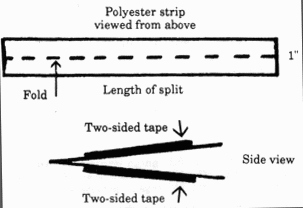

Editor's apologies: A crucial part of a sentence in the second paragraph was omitted from Gary Saretzky's text in the last issue. Here is the complete text, along with a diagram.
 Cardboard record
jackets for long playing records (33s) often are found with split
edges, which occur because the acidic cardboard is folded at the
edge, creating an inherent weakness. These splits typically occur
first at the bottom edge. External repair with tape changes the
appearance of the jacket and is therefore unacceptable. It is also
not feasible to glue the edges back together because the internal
dimension will be reduced and the discs will no longer fit.
Cardboard record
jackets for long playing records (33s) often are found with split
edges, which occur because the acidic cardboard is folded at the
edge, creating an inherent weakness. These splits typically occur
first at the bottom edge. External repair with tape changes the
appearance of the jacket and is therefore unacceptable. It is also
not feasible to glue the edges back together because the internal
dimension will be reduced and the discs will no longer fit.
My son Nicholas, when he was eight years old, suggested the following quick repair method, which I call, in his honor, the "Nickety Split." Place the jacket flat on a table, with the split edge closest to you. Cut a length of polyester (I prefer 4 mil in thickness) equal to the length of the split and one inch in width. Fold in half along the long dimension and crease with a bone folder. Attach 1/4 inch double-sided tape along both sides of the creased edge. Peel off one side of the paper backing on the tape. Lift up the top half of the jacket and affix the polyester inside the jacket along the edge of the bottom half of the jacket, with the fold in the plastic along the outer edge. Do not let the plastic extend beyond the edge of the cardboard. Peel the other paper backing off and press down on the jacket to firmly attach the Nickety Split, which will now act as a sling to support the disc and keep the edge closed.
Sometimes, it will be noticed that there is frilling of the paper that originally covered the cardboard along the edge. I use PVA adhesive Jade 403 to secure the paper and further improve the appearance of the jacket, which is then sleeved in virgin polyethylene to prevent further damage from abrasion.
The Nickety Split works well when the entire edge of the jacket is split or a portion is split starting at the corner on the open side where the disc is inserted. It is very difficult to use when there is a split only in the middle of an edge.
Although this method may be objectionable for very valuable albums, in that it is not easily reversible, it does effectively close the break without changing the appearance of the jacket, stops further splitting, and allows for continued use of the jacket for filing purposes.
Gary Saretzky is the Monmouth County Archivist, in Manalapan, NJ.